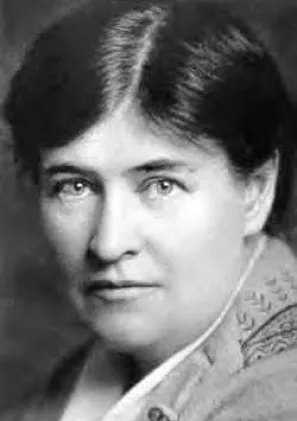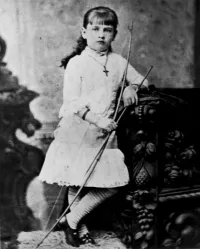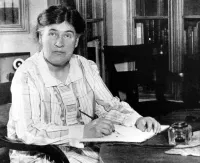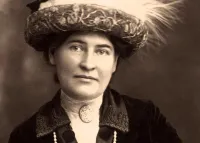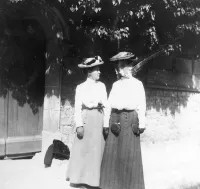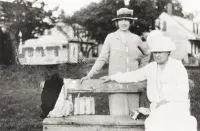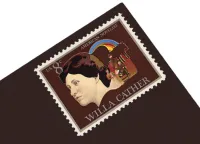Biography
1873 - 1947
“There are some things you learn best in calm, and some in storm.”
– Willa Cather
Pulitzer Prize winning American novelist Willa Cather was born near Winchester, Virginia – but it was the vast expanse of Nebraska, where she grew up, that became the setting for her most-revered works. In 1890, Cather began studying at the University of Nebraska. Upon graduation, she moved to Pittsburgh to work as a magazine editor and high school teacher. It was there that she met Isabelle McClung, with whom she became intimate. Cather was invited to live in the McClung family home where, for the first time, she had a quiet, private, workspace from which she published poetry and short stories that generated critical praise, if not commercial success. In 1905, she moved to New York City to become editor for McClure’s Magazine. It was there that she was advised by friend and mentor (and lesbian author) Sarah Orne Jewett to find her “own quiet center” by writing about the people and places that she had known in Nebraska. Heeding Jewett’s advice, Cather left McClure’s in 1912 to devote herself entirely to penning stories featuring strong female protagonists inspired by the girls and young women who had helped tame the wild land of her youth. Her Nebraska-themed novels included O, Pioneers! (1913), The Song of the Lark (1915), My Antonia (1918), One of Ours (1922), and A Lost Lady (1923). She is also noted for The Professor’s House (1925), My Mortal Enemy (1926), Death Comes for the Archbishop (1927) – which has been called “one of the greatest gay love stories in 20th Century American Literature” – and Sapphira and the Slave Girl (1940). Poor health prevented Cather from much productivity during the 1930’s and 1940’s. She died on April 24, 1947 and is buried in Jaffrey, New Hampshire. Scholarship regarding Cather’s lesbianism began to emerge in the late 1980’s, though some have protested this characterization, aided by Cather’s efforts to seal her records upon her death. However, recently published personal letters suggest a more complete understanding of this complex woman will soon be possible. It is perhaps telling that Edith Lewis – her companion of 42 years – is buried at Cather's side.
1873 - 1947
“There are some things you learn best in calm, and some in storm.”
– Willa Cather
Pulitzer Prize winning American novelist Willa Cather was born near Winchester, Virginia – but it was the vast expanse of Nebraska, where she grew up, that became the setting for her most-revered works. In 1890, Cather began studying at the University of Nebraska. Upon graduation, she moved to Pittsburgh to work as a magazine editor and high school teacher. It was there that she met Isabelle McClung, with whom she became intimate. Cather was invited to live in the McClung family home where, for the first time, she had a quiet, private, workspace from which she published poetry and short stories that generated critical praise, if not commercial success. In 1905, she moved to New York City to become editor for McClure’s Magazine. It was there that she was advised by friend and mentor (and lesbian author) Sarah Orne Jewett to find her “own quiet center” by writing about the people and places that she had known in Nebraska. Heeding Jewett’s advice, Cather left McClure’s in 1912 to devote herself entirely to penning stories featuring strong female protagonists inspired by the girls and young women who had helped tame the wild land of her youth. Her Nebraska-themed novels included O, Pioneers! (1913), The Song of the Lark (1915), My Antonia (1918), One of Ours (1922), and A Lost Lady (1923). She is also noted for The Professor’s House (1925), My Mortal Enemy (1926), Death Comes for the Archbishop (1927) – which has been called “one of the greatest gay love stories in 20th Century American Literature” – and Sapphira and the Slave Girl (1940). Poor health prevented Cather from much productivity during the 1930’s and 1940’s. She died on April 24, 1947 and is buried in Jaffrey, New Hampshire. Scholarship regarding Cather’s lesbianism began to emerge in the late 1980’s, though some have protested this characterization, aided by Cather’s efforts to seal her records upon her death. However, recently published personal letters suggest a more complete understanding of this complex woman will soon be possible. It is perhaps telling that Edith Lewis – her companion of 42 years – is buried at Cather's side.
Lesson Plan
Please login or register for an account to view this lesson plan.
Demography
Demography
Gender Female
Sexual Orientation Lesbian
Gender Identity Cisgender
Ethnicity Caucasian/White
Faith Construct Protestant
Nations Affiliated Canada United States
Era/Epoch Progressive Era (1890-1920)
Field(s) of Contribution
Art, Music, Literature & Theater
Author
Editor
Education
Journalism
Poet
Social Sciences
US History
Commemorations & Honors
Pulitzer Prize Winner For One of Ours (1923)
American Academy of Arts and Sciences Fellow (1943)
National Institute of Arts and Letters Gold Medal For Fiction (1944)
Willa Cather Foundation Established (1955)
Posthumous Nebraska Hall of Fame Inductee (1962)
U.S. Postal Service Commemorative Stamp Issued (1973)
Willa Cather Half-Ounce Gold Medallion Created by the U.S. Mint (1981)
Posthumous National Cowgirl Museum and Hall of Fame Inductee (1986)
Posthumous National Women's Hall of Fame Inductee (1988)
Death Comes For the Archbishop Included in the Modern Library 100 Best Novels (1998)
Virginia Women in History Inaugural Class of Honorees (2000)
Willa Cather Foundation Received a National Endowment of the Humanities Grant (2006)
Posthumous New York Writers Hall of Fame Inductee (2011)
Demography
Gender Female
Sexual Orientation Lesbian
Gender Identity Cisgender
Ethnicity Caucasian/White
Faith Construct Protestant
Nations Affiliated Canada United States
Era/Epoch Progressive Era (1890-1920)
Field(s) of Contribution
Art, Music, Literature & Theater
Author
Editor
Education
Journalism
Poet
Social Sciences
US History
Commemorations & Honors
Pulitzer Prize Winner For One of Ours (1923)
American Academy of Arts and Sciences Fellow (1943)
National Institute of Arts and Letters Gold Medal For Fiction (1944)
Willa Cather Foundation Established (1955)
Posthumous Nebraska Hall of Fame Inductee (1962)
U.S. Postal Service Commemorative Stamp Issued (1973)
Willa Cather Half-Ounce Gold Medallion Created by the U.S. Mint (1981)
Posthumous National Cowgirl Museum and Hall of Fame Inductee (1986)
Posthumous National Women's Hall of Fame Inductee (1988)
Death Comes For the Archbishop Included in the Modern Library 100 Best Novels (1998)
Virginia Women in History Inaugural Class of Honorees (2000)
Willa Cather Foundation Received a National Endowment of the Humanities Grant (2006)
Posthumous New York Writers Hall of Fame Inductee (2011)
Resources
Resources
Bohlke, L. Brent, Ed. Willa Cather in Person, Lincoln, Nebraska, 1986.
Lee, Hermoine. Willa Cather: Double Lives, NY, Pantheon, 1989.
Lewis, Edith. Willa Cather Living: A Personal Record, Lincoln, Nebraska, 1953.
Lindemann, Marilee. Willa Cather: Queering America, NY, Columbia, 1999.
O'Brien, Sharon. Willa Cather: The Emerging Voice, NY, Oxford, 1986.
Woodress, James. Willa Cather: A Literary Life, Lincoln, Nebraska, 1987.
Homestead, Melissa J. The Only Wonderful Things: The Creative Partnership of Willa Cather and Edith Lewis, Oxford University Press, 2021
https://www.ncbi.nlm.nih.gov/pubmed/3531325
https://www.nytimes.com/1983/09/11/books/the-point-of-view-was-masculine.html
https://www.newyorker.com/magazine/2017/10/02/a-walk-in-willa-cathers-prairie
Resources
Bohlke, L. Brent, Ed. Willa Cather in Person, Lincoln, Nebraska, 1986.
Lee, Hermoine. Willa Cather: Double Lives, NY, Pantheon, 1989.
Lewis, Edith. Willa Cather Living: A Personal Record, Lincoln, Nebraska, 1953.
Lindemann, Marilee. Willa Cather: Queering America, NY, Columbia, 1999.
O'Brien, Sharon. Willa Cather: The Emerging Voice, NY, Oxford, 1986.
Woodress, James. Willa Cather: A Literary Life, Lincoln, Nebraska, 1987.
Homestead, Melissa J. The Only Wonderful Things: The Creative Partnership of Willa Cather and Edith Lewis, Oxford University Press, 2021
https://www.ncbi.nlm.nih.gov/pubmed/3531325
https://www.nytimes.com/1983/09/11/books/the-point-of-view-was-masculine.html
https://www.newyorker.com/magazine/2017/10/02/a-walk-in-willa-cathers-prairie
